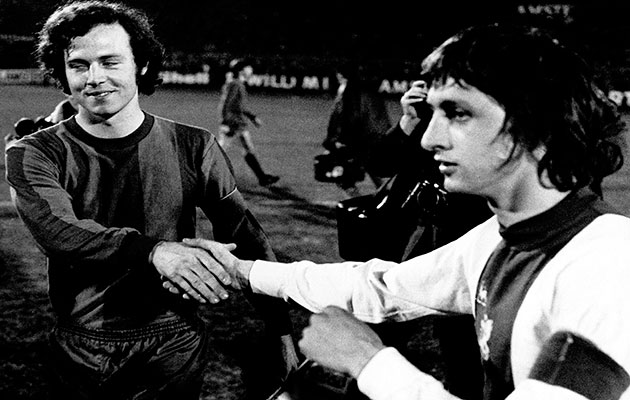Johan Cruyff, who has died, once told me that he was not especially fast, he simply got off the mark quicker than his opponents.
If they did manage to block him, he could leave them standing with the extraordinary so called Cruyff Turn, whereby he feinted to cross the ball but dragged it back behind the standing leg with his other foot, turning a half circle then leaving his opponent stranded. The wonder of it was that for all his supreme achievements, three times European Footballer of the Year, thrice in a row winner with Ajax of the European Cup, he was never a World Cup winner. He should have been so in 1974 in West Germany, when his Dutch team was the most impressive of all.
I shall never forget the goal that he and his formidable foil Johan Neeskens created against a bruising Brazilian team under the rain in Dortmund. Haring up the right flank – though much of his best work was done on the left, Cruyff sent the powerful midfielder Neeskens through the middle, received the ball from him, then crossed it perfectly for Neeskens to drive it home.
They and their ultimate conquerors, the West Germans, were playing what came to be called Total Football, the bold ethos of which was that anybody could do anything; attackers defend, defenders such as Holland left-back Rudi Krol, known to pop up at outside-right. Arguably though the first Total Footballer, much admired by Cruyff himself, was Alfredo Di Stefano, capable of covering the whole field with the Real Madrid team he inspired to win the first five European Cups.
The other role model for Cruyff was a fellow Dutchman Faas Wilkes, a tall slim inside-forward who figured in the Rest of Europe team beaten by Great Britain at Hampden Park in 1947, and was highly successful when he joined Inter in Milan.
Cruyff, as we know, came form humble origins, his father dying young, his mother cleaning the club offices, until one day she asked if her young boy could be taken on by the club. He was and with swift and consistent success.
Ajax were what you might call a nurturing club. They looked after their aspiring players off the pitch as well as on it. Cruyff himself was a rapid and remarkable learner. I shan’t easily forget attending a Press reception by the Dutch in their Hiltrup training base during the 1974 World Cup. Surrounded by a polyglot of journalists he dealt effortlessly with them in Dutch, English, German, Spanish and Italian.
So what went wrong in that 1974 World Cup final in Munich, which Holland began so majestically? I was among those who marvelled at the way in which Holland began the match, infuriating the whistling German crowd from the kick-off with their possession football, then breaking away to erupt through the German defence. Cruyff’s dynamic run took him all the way into the penalty area where he was tripped – Neeskens slamming in the penalty.
It should have been the beginning of a profusion of goals, but instead the Dutch seemed content to roll the ball about in pretty patterns. Was this, as some afterwards surmised, deliberately to humiliate the German, with memories of the Nazis brutal domination of Holland during the Second World War?
In the event, Germany equalised from a spot kick and Holland’s chance was thrown away when late in the half Cruyff and Johnny Rep broke though a vulnerable defence, left Beckenbauer behind and Cruyff gave Rep what seemed the easiest of chances. But he failed, Sepp Maier the keeper saving at his feet and West Germany went on to win.
Four years later in Argentina I’m convinced Holland would have beaten the hosts in the final were Cruyff to have played. Why did he refuse? The most likely if belated explanation is that there was a terrifying attempt by armed men to kidnap himself and his family, which kept him at home.
And so to Barcelona, where he would continue to excel, first as player, later as their inspirational manager. I’d place him third in my list of great players, behind only Di Stefano and the finest of them all Pele.
******************************
Oh dear, one though, watching at Wembley. If only that game hadn’t been played at all. Sheer anti-climax after the success in Berlin.
What it did show us was that Jamie Vardy is a fully-fledged and significant international player, certainly not to be confined to the left wing as he had been in the past.
True Germany had a goal disallowed in that earlier game but they wouldn’t have scored against Butland had he shown the sense to indicate that he was injured, going off for treatment rather than staying on to give away the goal.
England still need a second centre-back to complement Chris Smalling. John Stones, for all his talent, isn’t the answer. Unlucky as he was to slip, paving the way for the opening Dutch goal, the fact is that he gave away chances.
But Harry Kane has emerged as a formidable centre forward, Dele Alli is a splendidly precocious talent, Dier who took his winning goal so well, a solid defender, though it will be good to have Jo Hart back in goal. Quite why Danny Drinkwater was chosen man of the match after a modest display remains a mystery.
But why did England stand still protesting against the Holland winner?







